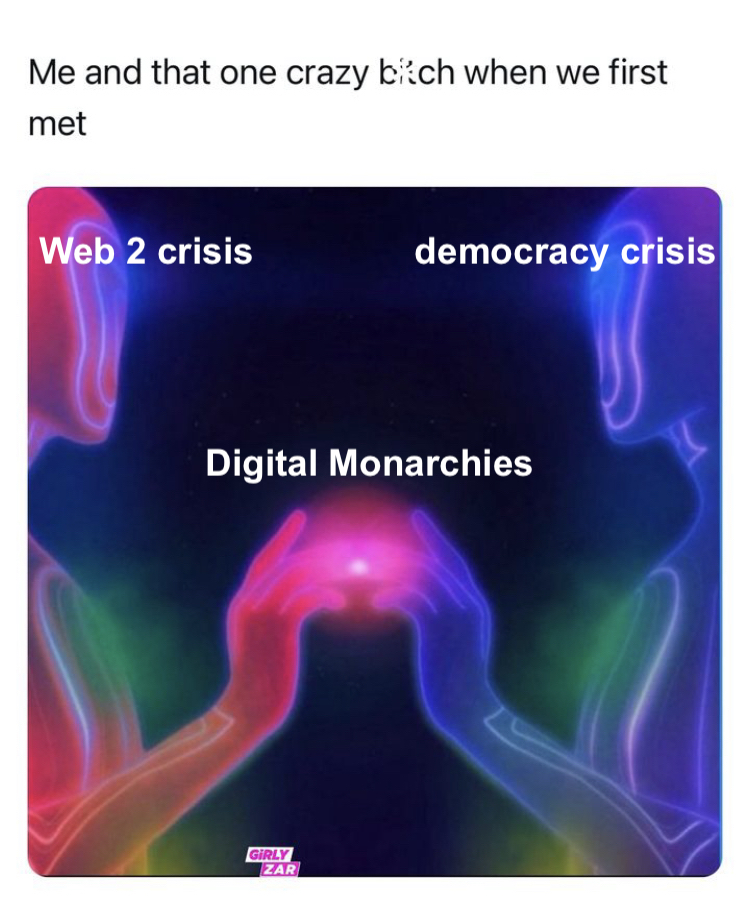Digital Monarchies
About
In the fertile ground between these crises, digital monarchies are poised to emerge and flourish. These alternative forms of governance offer radical possibilities for reimagining how we live and organize—challenging old ideas of borders, citizenship, and what it means to claim land.

Cartographies of Digital Monarchies
My PhD project, titled "Cartographies of Digital Monarchies," explores the convergence of two pivotal crises: the unraveling of the nation-state and the fading relevance of Web 2.0. The nation-state, as we know it, struggles to keep pace with an increasingly decentralized and fluid world. Similarly, the Web 2.0 internet feels outdated, incapable of delivering the sovereignty and agency that digital societies are beginning to demand. Both systems, weighed down by their own limitations, are becoming relics of a past world.
![]()
In the fertile ground between these crises, digital monarchies are poised to emerge and flourish. These alternative forms of governance offer radical possibilities for reimagining how we live and organize—challenging old ideas of borders, citizenship, and what it means to claim land. In these digital monarchies, new approaches to land and nation are unfolding, where identity is fluid, trust is decentralized, and reputations evolve dynamically, constantly reshaped by the shifting landscape of digital existence.
![]()
Inspired by Balaji Srinivasan’s Network State concept, my research delves into how self-sovereign digital societies can take form, where the notion of land is abstracted into networked territories and nation becomes an evolving community bound by shared values and trust, rather than geographic borders. Using platforms like Urbit, I investigate how these digital monarchies could redefine power and belonging in this new, virtual terrain.
My approach is grounded in speculative thought and future-oriented experiments. I integrate practices from my workshops like "Ideology Generator," where we engage in tech-driven social dreaming, imagining the futures we could build. In this speculative space, digital monarchies are not just theoretical—they are the early glimmers of a radical shift in how we might govern, belong, and reimagine the concept of nationhood in the digital future.
![]()

In the fertile ground between these crises, digital monarchies are poised to emerge and flourish. These alternative forms of governance offer radical possibilities for reimagining how we live and organize—challenging old ideas of borders, citizenship, and what it means to claim land. In these digital monarchies, new approaches to land and nation are unfolding, where identity is fluid, trust is decentralized, and reputations evolve dynamically, constantly reshaped by the shifting landscape of digital existence.

Inspired by Balaji Srinivasan’s Network State concept, my research delves into how self-sovereign digital societies can take form, where the notion of land is abstracted into networked territories and nation becomes an evolving community bound by shared values and trust, rather than geographic borders. Using platforms like Urbit, I investigate how these digital monarchies could redefine power and belonging in this new, virtual terrain.
My approach is grounded in speculative thought and future-oriented experiments. I integrate practices from my workshops like "Ideology Generator," where we engage in tech-driven social dreaming, imagining the futures we could build. In this speculative space, digital monarchies are not just theoretical—they are the early glimmers of a radical shift in how we might govern, belong, and reimagine the concept of nationhood in the digital future.
